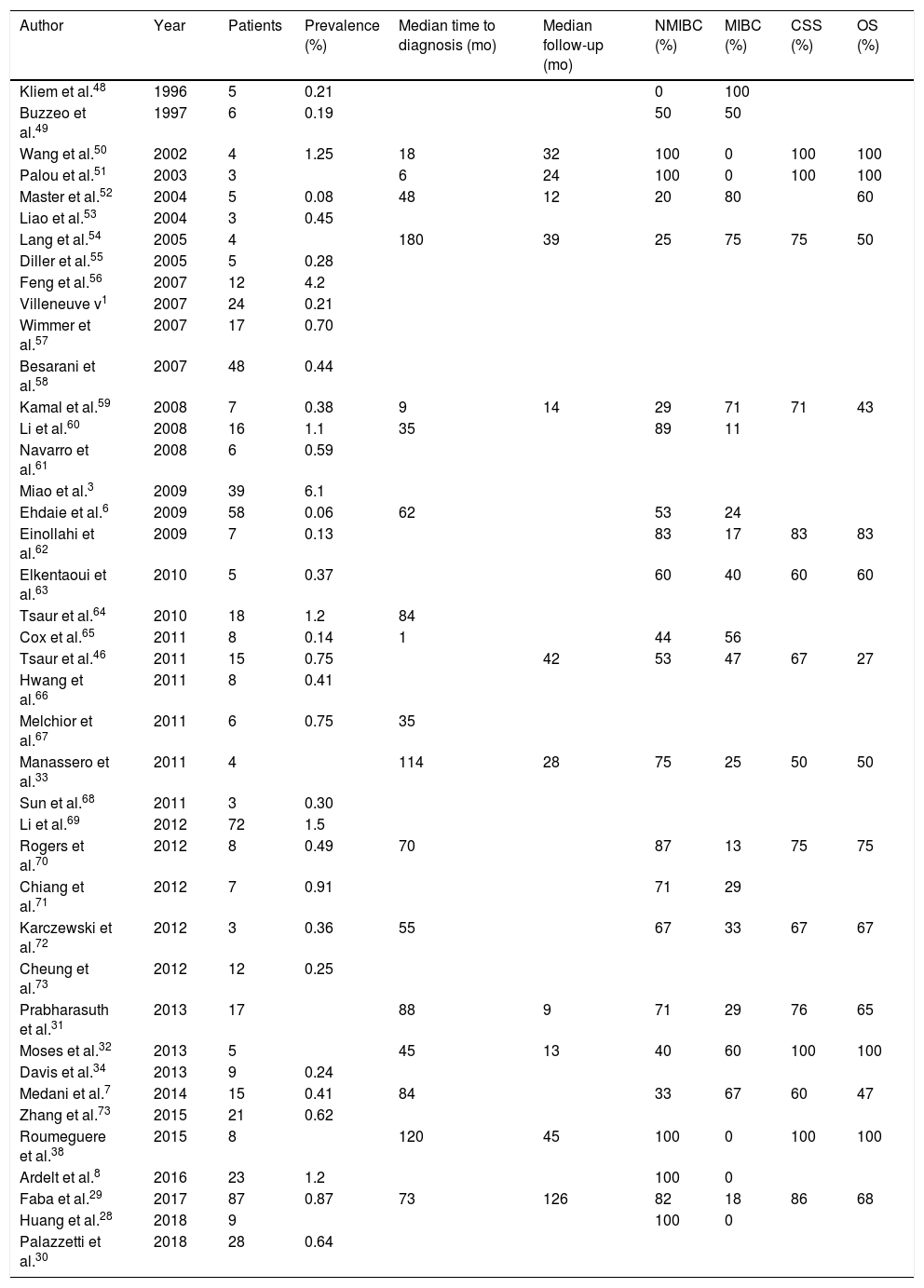Kidney transplantation is associated with an increased risk of bladder cancer; however guidelines have not been established on the management of bladder cancer after kidney transplantation.
Materials and methodsA systematic literature review using PubMed was performed in accordance with the PRISMA statement to identify studies concerning the prevalence and survival of bladder cancer after kidney transplantation. The risk factors and management of bladder cancer after kidney transplantation were also reviewed and discussed.
ResultsA total of 41 studies, published between 1996 and 2018, reporting primary data on bladder cancer after kidney transplantation were identified. Marked heterogeneity in bladder cancer prevalence, time to diagnosis, non-muscle invasive/muscle-invasive bladder cancer prevalence, and survival was noted. Four studies, published between 2003 and 2017, reporting primary data on bladder cancer treated with Bacillus Calmette-Guérin (BCG) after kidney transplantation were identified. Disease-free survival, cancer-specific survival, and overall survival were similar between BCG studies (75–100%).
ConclusionsCarcinogen exposure that led to ESRD, BKV, HPV, immunosuppressive agents, and the immunosuppressed state likely contribute to the increased risk of bladder cancer after renal transplantation. Non-muscle invasive disease should be treated with transurethral resection. BCG can be safely used in transplant recipients and likely improves the disease course. Muscle-invasive disease should be treated with radical cystectomy, with special consideration to the dissection and urinary diversion choice. Chemotherapy and immune checkpoint inhibitors can be safely used in regionally advanced bladder cancer with potential benefit. mTOR inhibitors may reduce the risk of developing bladder cancer, and immunosuppression medications should be reduced if malignancy develops.
El trasplante renal se asocia a un mayor riesgo de cáncer de vejiga; sin embargo, no existen directrices sobre el tratamiento del cáncer de vejiga tras el trasplante renal.
Materiales y métodosSe realizó una revisión sistemática de la literatura utilizando PubMed y siguiendo las directrices PRISMA para identificar estudios relacionados con la prevalencia y la supervivencia del cáncer de vejiga después del trasplante de riñón. También se revisaron y discutieron los factores de riesgo y el tratamiento de la enfermedad en este contexto.
ResultadosSe identificaron un total de 41 estudios publicados entre 1996 y 2018, que incluían datos primarios sobre el cáncer de vejiga después del trasplante de riñón. Se observó una marcada heterogeneidad en términos de la prevalencia del cáncer vesical, el tiempo hasta el diagnóstico, la prevalencia del cáncer vesical no músculoinvasivo/músculoinvasivo, y la supervivencia. Se identificaron 4 estudios, publicados entre 2003 y 2017, que incluían datos primarios sobre el cáncer de vejiga tratado con el bacilo de Calmette-Guérin (BCG) después del trasplante de riñón. La supervivencia libre de enfermedad, la supervivencia específica del cáncer y la supervivencia global, fueron similares entre los estudios de BCG (75–100%).
ConclusionesLa exposición a carcinógenos causante de ERET, VBK y VPH, los agentes inmunosupresores y el estado de inmunosupresión probablemente contribuyen a un mayor riesgo de cáncer de vejiga después del trasplante renal. La enfermedad no músculoinvasiva debe tratarse con resección transuretral. La BCG puede utilizarse con seguridad en los receptores de trasplante y probablemente mejore la evolución de la enfermedad. La enfermedad músculo invasiva debe ser tratada con cistectomía radical, tomando en especial consideración la disección y la elección de la derivación urinaria. La quimioterapia y los inhibidores de puntos de control inmunitario pueden utilizarse de forma segura y con un beneficio potencial en los casos de cáncer de vejiga con diseminación regional. Los inhibidores de mTOR pueden disminuir el riesgo de desarrollar cáncer de vejiga, y los medicamentos inmunosupresores se deben reducir en caso de desarrollo de una neoplasia.









